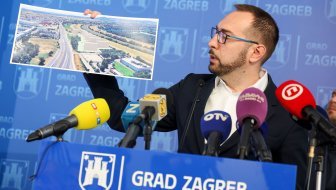Former Croatian Prime Minister Ivo Sanader told a parliamentary commission investigating the privatisation of the INA oil company on Tuesday that his decision to resign as Prime Minister in 2009 was due to Slovenia's obstruction of Croatia's EU accession talks.
"My departure had nothing to do with INA's privatisation. What did it have to do with? Croatia's EU entry talks were blocked because of Slovenia. I wasn't willing to trade territory for membership in the EU, that's why I left," Sanader told Social Democrat Josip Leko at the end of his testimony before the commission, which lasted three hours.
He said that before deciding to amend the Shareholders' Agreement between INA and MOL, all members of his cabinet and the leadership of the Croatian Democratic Union (HDZ) had been informed about all important elements of the amendments.
"The moment the government votes on a matter, I consider the procedure completed. I assume that all processes have been completed and that all participants are familiar with and know what they are voting on," Sanader said.
"All elements relevant for deciding on the Shareholders' Agreement were presented and discussed also by the HDZ Presidency on several occasions," Sanader said in response to a question from commission member Ana Lovrin of the HDZ.
The former PM recalled that he had requested the then Deputy PM Jadranka Kosor, who is now Prime Minister, to take part in the negotiating process shortly before its completion, but would not comment on the fact that the government denied that Kosor had attended meetings on negotiations about INA.
He dismissed speculation that the government had made strategic decisions, including ones regarding INA, in phone conferences, or that the government had signed an agreement with MOL to take over INA's gas business in order to offer MOL more favourable conditions for purchasing additional INA shares.
Sanader said the main reason for the government's taking over INA's gas operations was the gas crisis caused by the stoppage of gas deliveries from Russia to Ukraine and the rest of Europe. "One should have thought about taking over INA's gas business back in 2002 or 2003 and selling the company without that segment," Sanader said, adding that he had no information on an annex to that agreement and calling for making it public.
He disagreed with the view of the opposition members of the commission that he had chosen the wrong time for the initial public offering of seven percent of INA shares held each by war veterans and INA's employees and 15 percent of shares owned by the government, based on which MOL acquired close to 48 percent of INA's stock.
He also dismissed the opposition's claims that the disproportion in managing rights over INA was due to the 2009 amendments to the Shareholders' Agreement.
He agreed with Goran Maric of the HDZ who said that MOL acquired greater managing rights in INA than the company's ownership structure allowed on the basis of the initial agreement on the sale of INA shares from 2003.
Commenting on why the HDZ, which at the time was in the opposition, had walked out of the parliament session that voted on INA's privatisation, Sanader said the HDZ was against MOL being given greater managing rights than allowed by INA's ownership structure and that the then government had not given it any information about INA's privatisation. "I can't claim that something illegal was under way at the time, but it is true that we were not familiar with some things," he said.
To back his claims that the Ivica Racan cabinet was not transparent about INA's privatisation, Sanader said the government led by Racan had chosen advisors on INA's privatisation through direct deals rather than publicly.
Asked by Maric why the government, when it became obvious in 2008 that INA's business results were very bad, failed to replace its members on the INA Management Board, Sanader said that such a decision was within the remit of the Supervisory Board.
Answering a question from Zlatko Koracevic of the People's Party (HNS), Sanader said that he believed the economic crisis had caused, to a large extent, INA's bad business results in 2008.
Asked by Koracevic about his position on Finance Minister Ivan Suker's claim that he did not attend any of the sessions of the government's commission in charge of INA's privatisation, Sanader replied: "It's important that you have a position. You are the commission".



































